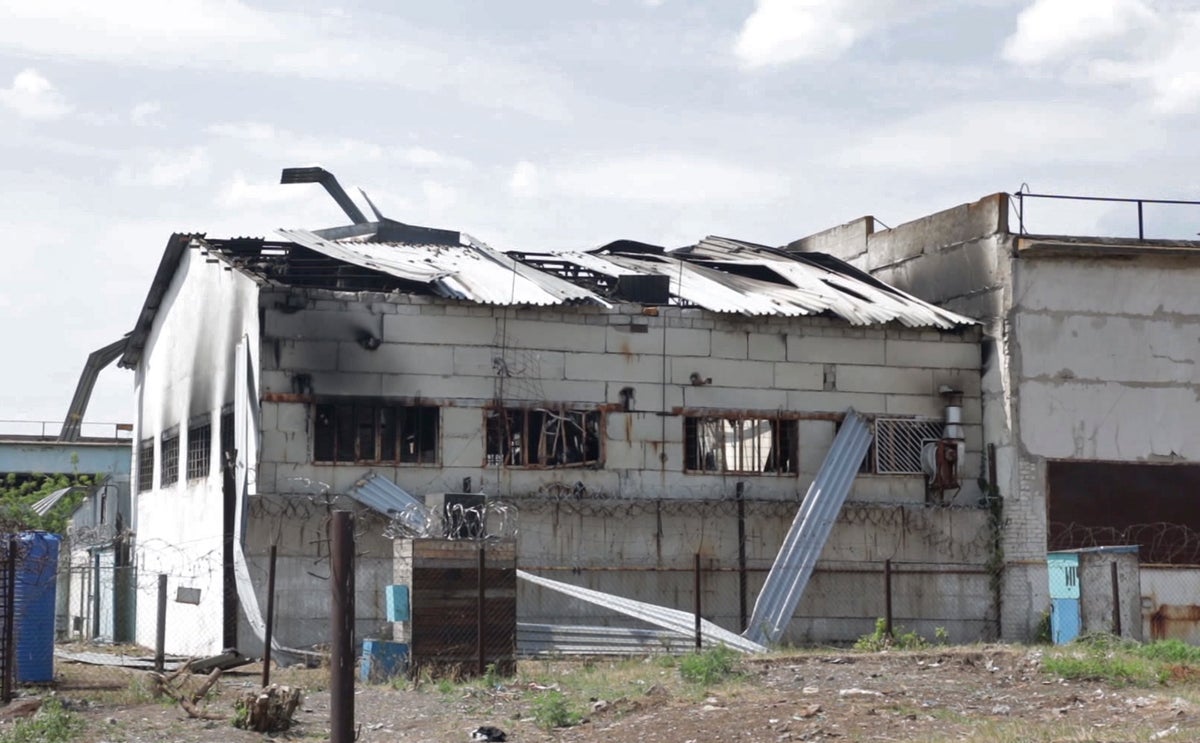
Ukrainian officials say they are struggling to establish the truth surrounding an explosion in a prison that killed dozens of Ukrainian prisoners of war captured by the Russians following the fall of Mariupol.
Ukraine’s human rights chief, Dmytro Lubinets, told The Associated Press he has tried to establish a direct link with his Russian counterpart in order to arrange a joint visit to the prison in Olenivka, a town in eastern Ukraine held by Russian-backed separatists.
“Dialogue is when there is a conversation between two parties. At this moment, this is an official request from me, which remains unanswered,” Lubinets said.
Separatist authorities and Russian officials say 53 Ukrainian POWs were killed and a further 75 were wounded Friday in the blast that ripped through a building at the prison. Both sides have blamed the other for the attack, saying it was premeditated with the aim of covering up atrocities.
Moscow opened a probe, sending a team to the site from its Investigative Committee, the country’s main criminal investigation agency. The state-run RIA Novosti agency claimed that fragments of U.S.-supplied precision High Mobility Artillery Rocket System rockets were found at the site.
The Ukrainian military, however, denied conducting any rocket or artillery strikes in Olenivka, and it accused the Russians of attacking the prison to cover up the torture and execution of Ukrainians there.
“Based on the analysis of the photos and videos that we have access to, we can say that it was an explosion from the inside of this barrack,” Lubinets said.
He said images from the scene show damage to only one building and not all the windows were blown out — something he says would not be possible if the complex was shelled.
Ukraine has appealed to the United Nations and to the International Committee of the Red Cross for help in investigating the blast and to find out more about the condition of the injured.
ICRC spokesman Oleksandr Vlasenko told the AP that the organization was currently negotiating with the Russians regarding visiting Olenivka. ICRC staff want to see everyone held there, make sure those wounded in the blast get proper medical treatment, and look at the bodies of the dead.
Russian officials on Saturday issued a list of the Ukrainian soldiers they said who had been killed or wounded in the attack, but the Ukrainians say they have been unable to verify the list while there is no access for the ICRC.
More than 2,400 soldiers from the Azov Regiment of the Ukrainian national guard and other military units defending the city of Mariupol surrendered under orders from Ukraine’s military in May.
Ukrainian President Volodymyr Zelenskyy has called upon the U.N. and the Red Cross, which acted as guarantors during the withdrawal of the Ukrainian military from the giant Azovstal steel mill in Mariupol, to preserve the lives of Ukrainian prisoners of war.
Olena Tolkachova, who is in charge of support services for the Azov Regiment, said she had received little information about the fate of the captured soldiers.
“According to the terms (of the withdrawal), the International Committee of the Red Cross had to visit our POWs every week and check the conditions of our soldiers. They were supposed to provide contact with relatives,” she said.
She said she believed the ICRC had only visited the prison once and she only discovered this from the Russian media. The support service is in touch with the ICRC seeking information about those who were killed or wounded in Olenivka.
“They do not give specific answers. They cannot explain to us why they cannot get there,” Tolkachova said, adding that relatives are desperate to know what happened to their loved ones and are calling every number they can find for any shred of information.
Vlasenko of the Red Cross said negotiations with the Russians are delicate.
“Any leak of information can be harmful. We inform about our actions only when they have taken place,” he added.
Russia’s Supreme Court on Tuesday declared Ukraine’s Azov Regiment a terrorist organization, a designation that could lead to terror charges against some of the captured fighters. Tolkachova said up to 1,000 soldiers from the Azov Regiment alone are currently in Russian captivity and the attack at Olenivka has raised concerns that no one can guarantee their safety.
“They were simply blown up. And this public execution, which was shown all over the world, isn’t that enough for the world to understand that they are in mortal danger?" Tolkachova said.
Lubinets hoped that at least the process of returning the bodies of those killed in Olenivka will begin soon.
“I can only hope that the principles of humanitarian law remain among the Russian Federation’s leaders,” Lubinets said.
___
Susie Blann contributed to this report.







